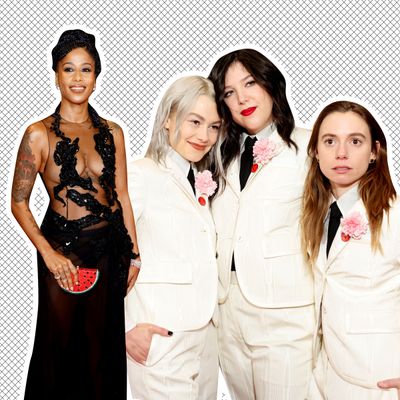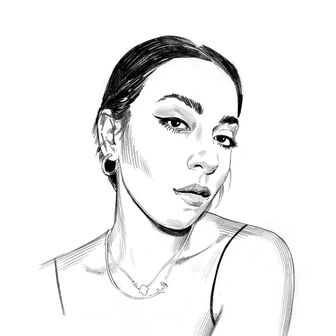
Can fashion be a sole vehicle for revolution? In my humble opinion, mostly no. After all, it’s still a business. What it can be, though, is a space for visibility, which several artists attending the Grammys leveraged to make a statement regarding the crisis in Gaza. The entertainment industry has been in tumult in the over 100 days since the war began, with artists having been fired from jobs and agents in hot water for voicing their opinions. But as time has passed and the humanitarian crisis continues to worsen, more creatives have used their platforms — and the millions of eyes they may have on them on red carpets — to take a stand.
The trio of boygenius, nominated for five awards tonight, showed up in matching Thom Browne suits and red “Artists4Ceasefire” pins on their lapels. The organization’s mission statement reads they intend “to lend our voices and our platforms to amplify the global call for an immediate and permanent cease-fire, the safe return of all hostages, and the immediate delivery of humanitarian aid to the civilians in Gaza,” and goes on to say, “We stand for our common humanity, and a future rooted in freedom, justice, dignity, and peace for all people.”
Aja Monet, nominated for Best Spoken Word Poetry Album tonight, who has openly advocated for Palestinian rights, was carrying a watermelon clutch. (The watermelon has been a symbol of Palestine for decades as the fruit bears the same colors as the Palestinian flag and has served as a placeholder in situations where the flag might not have been permitted.)
Esperanza Spalding, a double nominee, opted for the most overt show of solidarity on the red carpet by wearing a keffiyeh, a traditional Palestinian scarf. The scarf has become the most universal symbol of support for the Palestinian struggle, with its patterns representing important facets of Palestinian life. Noted in NPR, the black stripes are for the historical trade routes that ran through Palestine, the fishnet represents the Palestinians’ tie to the Mediterranean Sea, and the short, curved lines resemble the leaves of an olive tree, an important crop and symbol for Palestinians.



